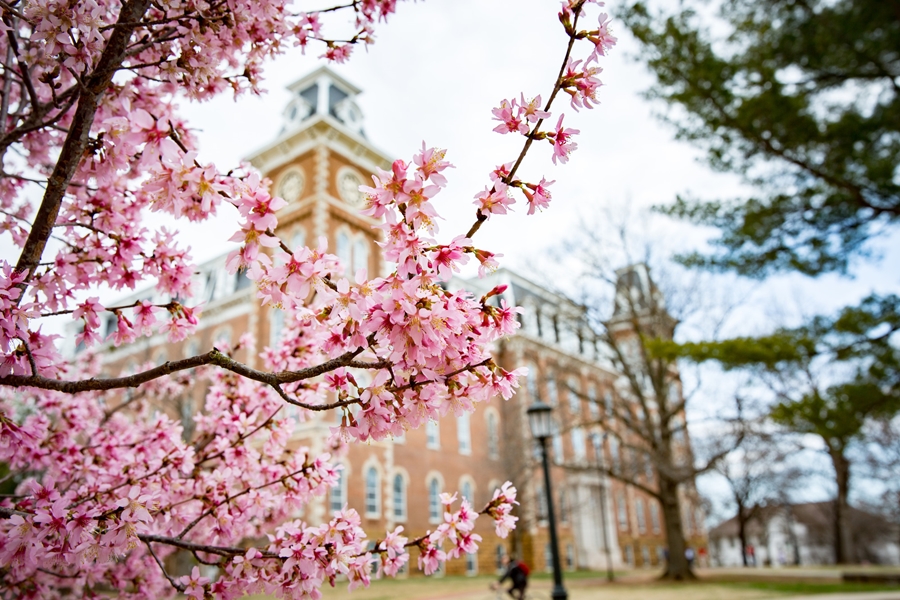The U of A, along with 74 other U.S. colleges and universities, are pushing the Biden Administration to adopt a target of at least 50 percent reduction in carbon emissions by 2030.
U of A chancellor Joe Steinmetz signed the letter on behalf of the university and said that climate change is one of the most pressing challenges facing humankind.
“The scale and complexity of the challenges involved, and the range of solutions required, will depend on the things that universities excel at: research and discovery, teaching and learning, outreach and engagement,” Steinmetz said. “It will take interdisciplinary collaboration, ingenuity, hard work and creative problem solving, as well as the ability to communicate, educate and persuade the public that climate change is real. The earlier we accept and prioritize this goal, the better it will be for future generations.”
The U of A, through the responsible actions of campus departments, is continuously working to lead by example on and off campus in creating a culture of sustainability. The U of A Office for Sustainability plays a key role in coordinating those efforts and works with the community to share best practices, evaluate policies and recommend programs to build a more resilient Fayetteville.
“When considering greenhouse gas emissions, a core tenet is that we’re all in this together,” said Eric Boles, director of the Office for Sustainability. “The U of A recognizes that mitigating our campus footprint is critically important but not nearly enough. We must lead by example, share best practices and empower our students to be climate leaders in their career paths.”
U OF A CLIMATE INITATIVES
The U of A carbon footprint is composed of on-campus emissions from the combustion of fossil fuels (i.e. diesel buses and natural gas for heating), off-campus emissions from electricity generation (i.e. coal or natural gas at power plants) and from indirect emissions embodied in air travel, campus commuting and products purchased (i.e. paper or potable water).
The university has been at the forefront of college campuses in reducing its carbon emissions as it became a charter signatory of the American College and University Presidents’ Climate Commitment in 2007 and pledged to be net carbon neutral by 2040.
This commitment led to the creation of the U of A’s Climate Action Plan in 2009 with updates in 2014 and 2018. As of 2021, the campus carbon footprint is near 1990 emission levels and has reduced over the past decade while increasing enrollment and built space.
Key initiatives include establishing a minimum standard of US Green Building Council LEED Silver for all new construction, deploying a combined heat and power system to produce 5MW of efficient energy onsite, and four rounds of Energy Savings Performance Contracts to fund over $50 million worth of energy conservation measures for the campus.
The U of A also continues to innovate and identify opportunities to reduce campus emissions and increase campus resilience. Recently, the U of A Division of Agriculture’s solar services agreement will develop a solar array designed to provide 85 percent of the electricity needs of the division facilities at the Milo J. Shult Agricultural Research Extension Center in Fayetteville. That project will save the U of A system millions of dollars with no upfront capital.
Students, faculty and staff can lend a hand in this global movement by choosing alternative transportation, conserving energy, reducing waste and speaking up.
For more information about how the university is creating a more sustainable community, visit sustainability.uark.edu.
About the Office for Sustainability: The mission of the University of Arkansas Office for Sustainability is to motivate, facilitate, and coordinate responsible practices through partnerships with students, faculty, and staff across all campus departments. The OFS uses the campus as a living laboratory by overseeing the implementation of the University of Arkansas environmental goals. These programs are part of the UA Resiliency Center, hosted by the Fay Jones School of Architecture and Design, and are supported by UA Facilities Management.
About the University of Arkansas: As Arkansas' flagship institution, the U of A provides an internationally competitive education in more than 200 academic programs. Founded in 1871, the U of A contributes more than $2.2 billion to Arkansas’ economy through the teaching of new knowledge and skills, entrepreneurship and job development, discovery through research and creative activity while also providing training for professional disciplines. The Carnegie Foundation classifies the U of A among the top 3% of U.S. colleges and universities with the highest level of research activity. U.S. News & World Report ranks the U of A among the top public universities in the nation. See how the U of A works to build a better world at Arkansas Research News.
Contacts
Eric Boles, director
Office for Sustainability
479-575-2405, eboles@uark.edu
